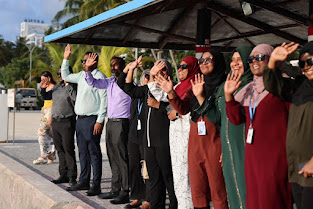A Return to Maafushi: Rediscovering Peace Beyond the City
My recent visit to Kaafu Maafushi for a training session was intended as a professional engagement — an opportunity to share knowledge and help build competence among the Council team. However, it evolved into something far more meaningful. It became a personal journey of reflection and reconnection, not only with the island itself but with a part of life that often gets buried under the noise of the city.
After the training, one of the participants kindly offered a brief tour of the island. I had been to Maafushi before, more than four times in fact, but this visit came after a 24-year gap. The island I remembered had changed — visibly and significantly. Once a modest tourist destination, Maafushi now stands with newly built guesthouses, vibrant cafés, and recreational spaces that bring both locals and visitors together. Yet, what struck me most wasn’t just the transformation in infrastructure. It was the spirit of the island — familiar, warm, and unchanged in the best possible way.
Children strolled with their grandparents, their faces relaxed and joyful. Elderly men and women gathered at the beach, their conversations slow and unhurried. Tourists laughed freely in roadside cafés. People greeted one another with genuine warmth. With fewer vehicles and less noise, the island carried a peacefulness that is becoming rare in modern life. It was alive, yet calm. Modern — yet grounded.
This was a stark contrast to Malé City, where I grew up. Life in the capital is often rushed, punctuated by sound pollution, traffic, and the subtle stress of urban living. It’s a place where safety is sometimes questioned, where parts of the city smell of neglect, and where daily life is shaped by rising costs and limited space. The roads that were once part of my childhood now carry the scent of cat feces and the sight of overflowing bins. The city has changed — not always for the better.
Still, Malé draws people from all corners of the country, offering what many rural areas cannot: better access to education, healthcare, and employment. While these are essential, what often goes unnoticed is the toll urban life takes on the human mind and body.
Being in Maafushi reminded me of how deeply our surroundings affect us. Peaceful environments — especially those surrounded by nature — offer a kind of healing that is hard to find in congested cities. Island life brings with it a slower rhythm, one that encourages people to breathe, to connect, and to be present. The sounds of the waves, the warmth of human connection, and the absence of constant sensory overload give the brain a chance to reset.
Research shows that such environments reduce stress and promote relaxation. They help regulate our sleep patterns, improve attention, and even enhance our capacity for empathy and patience. When we are surrounded by calm, our bodies respond with lowered blood pressure, steadier heart rates, and better immune function. The mind, too, becomes clearer, more focused, more resilient.
Even the social environment in Maafushi felt nourishing. The simplicity of interactions, the mutual respect between strangers, and the communal nature of everyday life contribute to emotional well-being. The absence of judgment and the presence of authentic smiles help create a sense of belonging that urban living often erodes.
As I walked through the island’s quiet lanes, I was reminded of a truth that is easy to forget: development is not only about buildings and systems; it is also about the emotional and mental space people have to thrive. Maafushi, in its quiet strength, offered that space.
When I returned to the city, I carried with me more than the outcomes of a successful training session. I returned with a sense of clarity — a reminder of the kind of life that fosters well-being, one not driven only by convenience but by balance.
In a world that often prioritizes speed and growth, Maafushi reminded me that healing, peace, and community are just as vital. Perhaps in our plans for development, we need to look more closely at the values that smaller islands protect so well — values that can teach our cities how to truly evolve.






.png)
Comments
Post a Comment